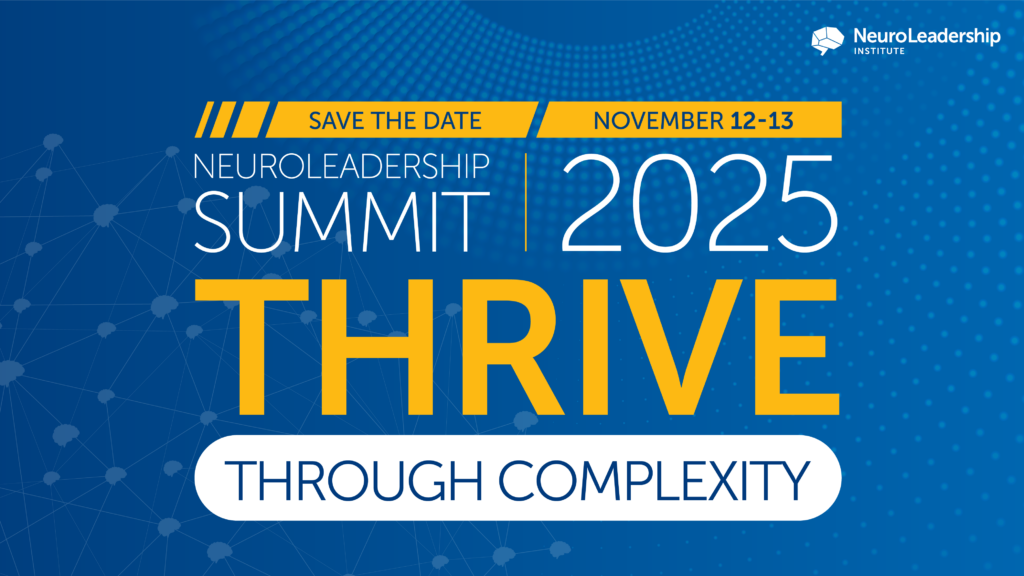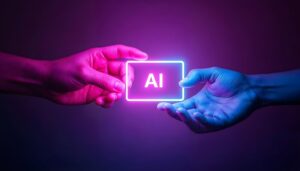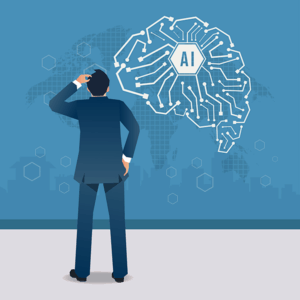by Chris Weller
Today marks Day 1 of the 2025 NeuroLeadership Summit: Thrive Through Complexity, a two-day event dedicated to a theme that so many leaders and organizations have been facing through geopolitical upheaval and AI-fueled technological change.
This year’s Summit marks the 20th conference since the first event was held on a hillside in Asolo, Italy in 2007. A lot about the working world has changed since then, but what has stayed the same is the need for brain-friendly leadership that supports how people think, feel, and behave in their jobs.
As leaders grapple with accelerating change, below we’ve captured three big insights from Day 1 that can help everyone feel equipped and empowered to navigate change successfully.
Secure your spot at Day 2 of the 2025 NeuroLeadership Summit: Thrive Through Complexity
An AI-Assisted Workforce Elevates Human Skills
In the opening keynote session, “Thrive Through Complexity,” panelists reflected on the challenges brought by AI, shifting global politics, and natural disasters. A key takeaway from the discussion was that organizations hoping to use AI to improve productivity must double down on the human element.
Dr. David Rock, Co-Founder and CEO of NLI, introduced the continuum of AI fluency, from resistors in Zone 1, to the ambivalent in Zone 2, to general users in Zone 3, and the AI fluent in Zone 4. It’s between Zone 3 and Zone 4 where most organizations waste their investments in AI, Dr. Rock said, because the general users use AI to replace their thinking, which makes them uncritical thinkers, but the fluent users use it to enhance their thinking. The goal, Dr. Rock said, is to get all employees to fluency.
Lindsay-Rae McIntyre, Chief Diversity Officer at Microsoft, said the way to bring people along requires a reinforcement of what makes people feel included at work. “For leaders, people have always wanted to feel heard, seen, and valued at their core, and all humans want to be supported,” she said. “So customized leadership, the ability to be a high performance coach, is super critical.”
AI provides this opportunity to customize leadership development beyond typical coaching. That’s also why NLI created NILES, the Neuro Intelligent Leadership Enhancing System, a natural-language AI coach trained on decades of NLI’s research and practice. NILES helps leaders go from feeling stuck to experiencing insight, which motivates them to take action and build new habits.
NILES even made an appearance in the opening keynote, reflecting on a story told by Steve Powell, CEO of Southern California Edison, the largest utilities provider in Southern California. NILES offered the insight that psychological safety is critical for performing under pressure because it allows teams to hold together rather than fall apart — an observation that itself reflects how an AI like NILES can support, rather than replace, human cognition.
Resilience Isn’t a Personality Trait — It Can Be Trained
When life (or work) gets hard, how do most people respond? As Lyndsay-Rae McIntyre noted in the opening keynote session, “brains that are hot don’t perform well.” Stress leads to more stress, which causes emotional, irrational thinking and hampers clear-headed rational thought.
Fortunately, University of California, Irvine, neuroscientist Dr. Golnaz Tabibnia, Ph.D., shared that how we respond to stress can be changed through active effort. Resilience, she said, isn’t a personality trait — rather, it’s a skill that anyone can learn. The trick is developing coping mechanisms that cause “coping neurons” to fire at the same time as our stress response, reducing our sense of threat while raising our feelings of reward.
For instance, employees going through organizational change can acknowledge the discomfort, reappraise it as a chance to learn something new, and practice “transcendent” techniques such as mindfulness, going for a walk, and creating psychological distance from the stress that all combine to help them re-engage their prefrontal cortex and feel more in control of their situation.
“Stress might beget more stress if we passively ignore it,” Dr. Tabibnia said, “but it can also make us stronger if we decide to do something about it.”
If AI Isn’t Making You Smarter, You’re Using It Wrong
In the Day 1 afternoon keynote session, on the future of AI in talent management, UCLA cognitive neuroscientist Matt Lieberman, Ph.D., observed that leaders’ primary fear with AI is that in the long run, they’ll end up with people who just aren’t as interested in being engaged and informed. With AI at their fingertips, employees will surrender their intelligence and critical thinking.
For this reason, Dr. Lieberman says that AI’s chief role at work must be to make people smarter. NLI’s own research suggests that organizations only benefit from AI when people become fluent users, not passive users hoping to offload everyday tasks.
Brian Kropp, VP of Global Insights at executive search firm Heidrick & Struggles, added to the point, saying AI must be woven into an overarching talent strategy. It can’t be a gimmick technology in search of a problem. “For companies that are able to identify major positive breakthroughs that drive revenue, it’s not going to be around improving individual task performance with AI,” he said. “It’s going to be around increasing collaboration.”
NLI’s own efforts to develop NILES began with this intent to support organizations and their existing talent management. Increasingly, the future of AI looks like sophisticated platforms embedded into recruiting, hiring, onboarding, coaching, development, promotions, and retirement planning. But be careful, Kropp says, because organizations need to be intentional about who benefits from these returns. Will it be only the shareholders, or will employees have a stake in the upside?
“If you don’t have an answer, it will default to shareholders and make employees and leaders less willing to experiment and try new things,” Kropp said. In other words, to preserve employees’ growth mindset around AI, leaders may want to take employees’ expectations into account if their AI talent strategies produce the best-case scenario. If AI creates massive upside, who deserves to benefit? What’s most fair given the work involved, and what will keep team members engaged to keep innovating?
Panelists agreed that these questions and more await us over the next five and ten years as AI becomes more and more ubiquitous in our working lives.
Want to have breakthrough insights like these? Register now for Day 2 of the 2025 NeuroLeadership Summit: Thrive Through Complexity






